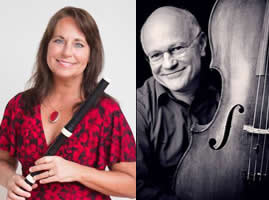The HIP Festival continues its quasi-Transalpine march, moving from peak to peak with bracing repertory and exceptional performances that consistently result in all the old music sounding new, as if being played for the first time, with (fortunately) substantial audiences listening intently, clearly hanging on every nuanced phrase. Maybe that’s still partly so we can perceive the difference in the old-fashioned big-orchestra treatments of some of these scores with which a few of the more senior attendees grew up. Golly, I’m glad that the first versions of the Brandenburgs I heard weren’t those big fat renditions by the Prades Festival Orchestra or Stoki or even Lenny…; in my case, it was Reiner’s pioneering 1949 recordings with a small ensemble, taken down in Pittsburgh (and readily available on YouTube), that helped lead the way to what we now regard as the “correct” approaches.
It took a while to get us to this point, of course. There was that performance by Alfred Deller at St. Mary’s, years ago, long before the Handel revival…. There were local and then visiting harpsichordists aplenty. There were occasional concerts by movement superstars from overseas. And then there was Chapel Hill’s Society for Performance on Original Instruments, later renamed Ensemble Courant. That was the late Richard Luby‘s baby – the true passion of a great Mischakoff-trained violinist who came to see the light – and hear the truth of historically-informed performance (HIP).* We thought often of Richard during the concert of Bach that marked the mid-point in this year’s HIP Fest – and also of his artistic co-directors Brent Wissick, who was on hand to play gamba in the Sixth Brandenburg, and Elaine Funaro, whose magnificent Klinkhamer double-manual harpsichord she’d loaned for the occasion. They weren’t the only stars of SocPerf (EnsCourant), but they helped make possible that glorious period in our history, and it was they who, collectively, gave us our very first HIP Brandenburgs in this region, a concert never to be forgotten, back in that first great Golden Age here that started in the ’80s.
So in fact the road to this grand evening of three Brandenburgs, preceded by the Second Orchestral Suite, had been magnificently paved, long before. But the latest was in fact still a completely revelatory Valentine’s Day evening, as fifteen superior specialist artists – called out below – performed these richly-varied works with staggering accuracy and keen artistic insight in the lovely sanctuary of Durham’s First Presbyterian Church.
The Orchestral Suite No. 2, S.1067, featured flutist Kathie Stewart, strings, and harpsichord, in a fabulous progression of dance movements, preceded by an overture. This is wonderful music, of course, and here it was grandly and enthusiastically played, as if everyone were celebrating, as in fact they surely were. And it’s a fact that our best artists today have advanced far since the early days of HIP in America, so we had the anticipated lower pitches, the chamber-music-like sense of ensemble, and contrasting instrumental textures that were palpable throughout, all conveyed with the utmost skill with virtually no clouds on this horizon – and precious few retunings, either, for that matter.
The Brandenburgs are all different – what was Bach thinking? – so there were changes in players as they unfolded. The Fifth is probably the best known, thanks to its extended keyboard solo in the first movement (encored briefly in the finale). Here, the star was Jennifer Streeter, harpsichord, with Stewart again featured, alongside violinist Janelle Davis. There were many delights, chief among which was the sublime realization of the slow movement, which seemed heaven-sent.
It’s a challenge to determine in what order to play these things, since the Sixth appears at first glance to be so soft-spoken that one might expect it to be anti-climactic – it’s scored for two violas – here Suzanne Rousso and Joey O’Donnell – plus two violas da gamba – Jaap ter Linden and Wissick – plus cello – Barbara Blaker Krumdieck – plus violone – Robbie Link – and harpsichord (Streeter). Low voices. But at close quarters we could readily perceive the different sounds of these instruments and savor the magic with which Bach utilized them. If there was a chief highlight of this evening – a highlight among many highlights – this was it.
The finale was the Fourth Brandenburg, and it worked well, thanks to its stem-winder of a conclusion. This featured a pair of recorders – Frances Blaker and Stewart – plus violin – David Wilson – with strings and harpsichord – in one of the evening’s more carefree readings, brimful of joy and endless delights. It really doesn’t get any better than this!
This was a production of the Mallarmé Chamber Players, relying heavily on the North Carolina Baroque Orchestra‘s principals. Watch our calendar for future concerts by both of these stellar ensembles.
And check out the remaining HIP events in our calendar or at the main HIP website.
***
Personnel: Kathie Stewart, flute and recorder; Frances Blaker, recorder; Jennifer Streeter, harpsichord; David Wilson, Janelle Davis, Matvey Lapin, Elizabeth Phelps, Leah Peroutka, & Allison Willet, violins; Suzanne Rousso & Joey O’Donnell, violas; Jaap ter Linden, cello & viola da gamba, & Barbara Blacker Krumdieck, cello; Robbie Link, violone; & Brent Wissick, viola da gamba
*Richard told me at one point that he’d had to struggle to learn not to apply vibrato in his own HIP work. I found it especially interesting therefore that the special guest at this concert (and the nominal director thereof) – ter Linden – used it liberally throughout, on both cello and gamba.











